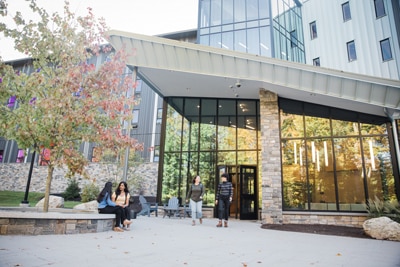Bachelor of Science in Cybersecurity New England campus experience

Program Overview Why get a cybersecurity degree on campus?
Secure information, test for vulnerabilities and identify malicious activity with a Bachelor of Science (BS) in Cybersecurity from Southern New Hampshire University. If you dream of stopping hackers and protecting data, you’re in the right place. In this campus program, you'll use cutting-edge security tools and techniques to assess risk, respond to cyber threats and solve complex problems.
The National Security Agency designated SNHU as a National Center of Academic Excellence in Cyber Defense, and we proudly offer this program in alignment with recognized standards like the National Initiative for Cybersecurity Education, Cybersecurity Workforce Framework and Cybersecurity Education Consortium.
Skills you'll learn
- Application of security principles
- Risk analysis and evaluation strategies
- How to define computing requirements
- Effective communication methods
- Legal and ethical judgment techniques

Courses & Curriculum Secure sensitive data with on-campus cybersecurity courses
In the on-campus cybersecurity program, you’ll integrate modern cybersecurity theory and application in authentic, hands-on learning experiences. Here, you'll start with foundational knowledge of operating systems, structured database environments, computer networks, applications and scripting. Then, you'll dive deep into advanced cybersecurity topics, learning skills needed to protect data, detect adversarial threats, assess organizational risk and address legal concerns.
Interested in learning in an online environment? This same curriculum is offered through SNHU's online cybersecurity degree.
Campus cybersecurity degree concentrations
Looking to specialize your degree? SNHU offers 2 concentrations for the cybersecurity degree.
The Bachelor of Science (BS) in Cybersecurity with a concentration in Data Analytics Fundamentals provides an introduction to the role of data analysis within an organization. You'll gain hands-on experience solving real-world problems using advanced data technologies, methods and tools, enabling you to present your findings in actionable ways.
By incorporating data analysis courses into your cybersecurity bachelor's degree program, you'll develop a better understanding of:
- The importance of high-quality data
- Gathering data for analysis
- Using data to solve organizational challenges
Career outlook:
Through 2032, job openings for database administrators are projected to grow 7% — faster than the rate of growth for all occupations, according to the U.S. Bureau of Labor Statistics (BLS).1
In May 2023, the median annual salary for this role was $101,510, according to the BLS.1
According to CyberSeek, entry-level roles in the field include:2
- Cybercrime analyst
- Cybersecurity specialist
- Incident and intrusion analyst
- IT auditor
Courses may include:
- Role of Data Analysis in Organizations
- Data Validation: Quality and Cleaning
- Gathering Requirements and Collecting Data
Learn about the essential methods and tools necessary to lead successful projects when you earn a Bachelor of Science (BS) in Cybersecurity with a concentration in Project Management Fundamentals.
You'll create project plans based on authentic scenarios and learn to work within the triple constraints of time, cost and scope. Plus, you'll explore the concepts of estimation, scheduling, contracting and procurement.
Career outlook:
Pairing project management courses with your cybersecurity studies and gaining hands-on experience can help you stand out in a competitive entry-level job market.
The BLS projects a 32% job growth for information security analysts through 2032 — far outpacing the average for all occupations.1 As of May 2023, these professionals earned a median annual salary of $120,360, with the highest 10% earning more than $182,370.1
Courses may include:
- Project Management for CAPM Certification
- Project Contracting and Procurement
- Resource Estimating and Scheduling
As part of this concentration, you are eligible to take our Project Management for CAPM® Certification course, which can help prepare you to take the PMI® Certified Associate in Project Management exam.
If you're seeking a more business-focused education, you may be interested in the project management concentration for business.
Learn from instructors with industry experience
Our faculty bring with them decades of knowledge and experience in cybersecurity, which informs the development of SNHU's courses and curriculum. They look forward to supporting your journey both in the classroom and as you work toward a career in your field.
Dr. Daniel Ward

Position
Assistant Professor, Information Technology
Joined SNHU
2024
Education
- PhD in Information Technology with an emphasis in Information Systems Security from the University of the Cumberlands
- MBA and MS in Cybersecurity and Information Assurance from Western Governors University
- MS in Psychology from Walden University
- BS in Behavioral Science from Granite State College
- Certifications: Cisco Certified Network Associate (CCNA), ISACA Certified Information Security Manager (CISM) and EC-Council Certified Ethical Hacker (CEH)
Dr. Daniel Ward has more than 15 years of experience in industrial control system/operational technology networking and cybersecurity. He's also an accomplished entrepreneur and investor in technology companies. Ward has served as senior ICS/OT cybersecurity architect at Celanese Corporation, vice president of IT4OT at Automated Control Concepts LLC and president of Coastal Industrial Technologies LLC. In these roles, he provided strategic guidance on industrial network design, SCADA, ICS and OT cybersecurity, and standards compliance. Ward has delivered numerous professional presentations and training sessions on industrial networking and automation technologies. He's an active member of ISACA and ISA.
Campus major courses
You’ll take major courses that provide you with a solid foundation in your area of study – in some cases featuring experiential or project-based learning opportunities, labs, simulations and internships. These courses will allow you to learn a wide variety of topics and help prepare you for a role in your desired field.
Courses may include:
Course catalog for the BS in Cybersecurity curriculum is coming soon.
Campus general education courses
All undergraduate students are required to take general education courses, which are part of SNHU's newly redesigned program, The Commons. The goal of The Commons' curriculum is to empower you with some of the most in-demand skills, so you can succeed not only in your academic career, but in your personal and professional life too.
Courses may include:
Can’t wait? You don’t have to!
Apply now if you’re ready, and have your decision within 30 days. Or, schedule a visit and come see us in person!
Have questions? Visit our Contact Us page.
Career Outlook What can I do with a cybersecurity degree?
From financial institutions and government agencies to school systems and healthcare organizations, skilled cybersecurity professionals are needed in any industry that requires specialists who can safeguard sensitive information. And whether you're interested in cryptography or ethical hacking, a degree in cybersecurity can lead you down a number of exciting career paths.
Career paths include:
- Information Security Analyst
- Cybersecurity Specialist
- Cybersecurity Analyst
- Cybersecurity Manager
Increase nationally in roles for information security analysts through 2032, projected by the U.S. Bureau of Labor Statistics.1
Median annual pay nationally for information security analysts as of May 2023, according to the BLS.1 Statistic not based on wage data for SNHU graduates.
Understanding the numbers
When reviewing job growth and salary information, it’s important to remember that actual numbers can vary due to many different factors—like years of experience in the role, industry of employment, geographic location, worker skill and economic conditions. Cited projections are based on Bureau of Labor Statistics data, not on SNHU graduate outcomes, and do not guarantee actual salary or job growth.

Campus Student Experience So, what's it like taking classes on campus?
At SNHU, we believe in learning by doing. Throughout your courses, you'll demonstrate your technical knowledge in simulations, labs and group projects — all while developing the soft skills you'll need to succeed in the real world. In the cybersecurity program, that might look like investigating a security breach, coding a remote access trojan or even building your own public key infrastructure. And when you're ready to put your skills to the test, you can compete in the National Cyber League Competition alongside peers from all over the country.

Student support
At SNHU, you don’t have to do this college thing alone. You’ll have help from your advisor, access to tutoring and office hours, career coaching, and mental health services so you can do your best and feel your best.
Additionally, our Office of Diversity and Campus Accessibility Center make campus a safe place for everyone. Visit our Student Services page to learn more about our support offerings.

Small class sizes
With an average class size of 15-25 (depending on your major) you’ll learn in an environment where professors with real world experience know you by name.
Here, you’re not getting lost in giant lecture halls, but instead, actively participating in thoughtful dialogue where you’re always encouraged to collaborate with your peers and ask questions when they arise.

State-of-the-art facilities
Our 300-acre campus has everything you need. From technology-advanced classroom settings to your dorms complete with fitness centers and hangout spots, our goal is to give you the best college experience possible.
Whether you’re learning in a classroom, in a lab, on the field, or in your field, you’ll have what you need to be successful from the moment you wake up to the moment you close your textbooks.
School of Engineering, Technology and Aeronautics Learn about the School of Engineering, Technology and Aeronautics
In the School of Engineering Technology and Aeronautics, you'll put theory into practice daily. From circuit projects to flight test classes, you'll collaborate with peers, faculty and the community to take on real-world challenges. With a drone-flying arena, unmanned aerial vehicle prep space, wood shop, robotics lab and more, you'll have all the tools at hand to bring your ideas off the page.
How SNHU makes college affordable
At Southern New Hampshire University, we're on a mission to make high-quality education more accessible with more affordable tuition. With 70+ career-focused majors, state-of-the-art facilities, D2 sports and over 70 student clubs and organizations, you can get the campus experience you've always dreamed of at a more affordable price.
Fill out the FAFSA to see if you’re eligible for grants or work-study. (You could also be offered loans, though you’ll have to pay those back later.)
Transfer up to 90 credits toward your bachelor's degree program at SNHU. If you’ve taken one course or many, we’ll evaluate them for you.
Getting free money for college – from SNHU or an outside organization – could help you save hundreds or even thousands of dollars.
Our collaborative partnerships with high schools enhance academic opportunities and college accessibility for some high school students.
Hear from us

Bringing the strengths of SNHU’s acclaimed online BS in Cybersecurity — designated as a National Center of Academic Excellence in Cyber Defense by the National Security Agency — to the on-campus experience is a game-changer for students.
Dr. Daniel Ward, Assistant Professor of Information Technology
Accreditations
SNHU is accredited by the regional accreditor the New England Commission of Higher Education (NECHE). The university also carries specialized accreditations for some programs.

Sources & Citations
1Bureau of Labor Statistics, U.S. Department of Labor, Occupational Outlook Handbook, on the internet, at:
- https://www.bls.gov/ooh/computer-and-information-technology/database-administrators.htm (viewed May 16, 2024)
- https://www.bls.gov/ooh/computer-and-information-technology/information-security-analysts.htm (viewed May 15, 2024)
Cited projections may not reflect local and/or short-term economic or job conditions and do not guarantee actual job growth.
2CyberSeek, Cybersecurity Career Pathway, on the internet, at https://www.cyberseek.org/pathway.html (viewed May 16, 2024)
Your dream school is waiting
Apply now or schedule a visit today.


